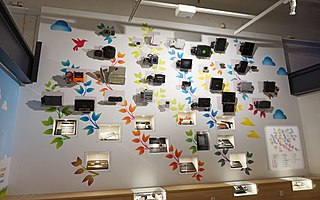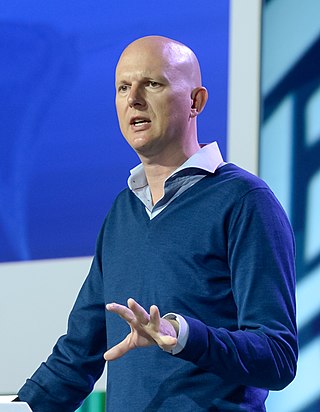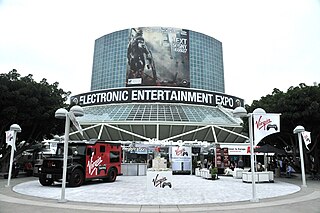Related Research Articles

The Atari 2600 is a home video game console developed and produced by Atari, Inc. Released in September 1977 as the Atari Video Computer System, it popularized microprocessor-based hardware and games stored on swappable ROM cartridges, a format first used with the Fairchild Channel F in 1976. The VCS was bundled with two joystick controllers, a conjoined pair of paddle controllers, and a game cartridge—initially Combat and later Pac-Man. Sears sold the system as the Tele-Games Video Arcade. Atari rebranded the VCS as the Atari 2600 in November 1982, alongside the release of the Atari 5200.

The PlayStation is a home video game console developed and marketed by Sony Computer Entertainment. It was released in Japan on 3 December 1994, followed by North America on 9 September 1995, Europe on 29 September 1995, and other regions following thereafter. As a fifth-generation console, the PlayStation primarily competed with the Nintendo 64 and the Sega Saturn.

The history of video games began in the 1950s and 1960s as computer scientists began designing simple games and simulations on minicomputers and mainframes. Spacewar! was developed by Massachusetts Institute of Technology (MIT) student hobbyists in 1962 as one of the first such games on a video display. The first consumer video game hardware was released in the early 1970s. The first home video game console was the Magnavox Odyssey, and the first arcade video games were Computer Space and Pong. After its home console conversions, numerous companies sprang up to capture Pong's success in both the arcade and the home by cloning the game, causing a series of boom and bust cycles due to oversaturation and lack of innovation.

A video game console is an electronic device that outputs a video signal or image to display a video game that can typically be played with a game controller. These may be home consoles, which are generally placed in a permanent location connected to a television or other display devices and controlled with a separate game controller, or handheld consoles, which include their own display unit and controller functions built into the unit and which can be played anywhere. Hybrid consoles combine elements of both home and handheld consoles.
The video game crash of 1983 was a large-scale recession in the video game industry that occurred from 1983 to 1985 in the United States. The crash was attributed to several factors, including market saturation in the number of video game consoles and available games, many of which were of poor quality. Waning interest in console games in favor of personal computers also played a role. Home video game revenue peaked at around $3.2 billion in 1983, then fell to around $100 million by 1985. The crash abruptly ended what is retrospectively considered the second generation of console video gaming in North America. To a lesser extent, the arcade video game market also weakened as the golden age of arcade video games came to an end.
The fifth generation era refers to computer and video games, video game consoles, and handheld gaming consoles dating from approximately October 4, 1993, to March 23, 2006. The best-selling home console was the Sony PlayStation, followed by the Nintendo 64 and Sega Saturn. The PlayStation also had a redesigned version, the PSone, which was launched on July 7, 2000.
2003 saw many sequels and prequels in video games, such as Tony Hawk's Underground, Madden NFL 2004, NBA Live 2004, ESPN NBA Basketball, Saya no Uta: The Song of Saya, Final Fantasy X-2, Mario Kart: Double Dash, Mario & Luigi: Superstar Saga, Prince of Persia: The Sands of Time, Sonic Heroes, Postal 2, Star Wars: Knights of the Old Republic, Uru: Ages Beyond Myst, and WWE SmackDown! Here Comes the Pain. New intellectual properties included Beyond Good & Evil, Boktai: The Sun is in Your Hand, Call of Duty, Disgaea, Drakengard, Manhunt, PlanetSide, TrackMania, True Crime: Streets of LA, and Viewtiful Joe. The year's best-selling video game worldwide was Pokémon Ruby/Sapphire, the fifth time a Pokémon games was the annual worldwide top-seller.

A home video game console is a video game console that is designed to be connected to a display device, such as a television, and an external power source as to play video games. While initial consoles were dedicated units with only a few games fixed into the electronic circuits of the system, most consoles since support the use of swappable game media, either through game cartridges, optical discs, or through digital distribution to internal storage.
The history of video game consoles, both home and handheld, began in the 1970s. The first console that played games on a television set was the 1972 Magnavox Odyssey, first conceived by Ralph H. Baer in 1966. Handheld consoles originated from electro-mechanical games that used mechanical controls and light-emitting diodes (LED) as visual indicators. Handheld electronic games had replaced the mechanical controls with electronic and digital components, and with the introduction of Liquid-crystal display (LCD) to create video-like screens with programmable pixels, systems like the Microvision and the Game & Watch became the first handheld video game consoles.

Sony Interactive Entertainment LLC (SIE) is an American video game and digital entertainment company that is a major subsidiary of Sony Group Corporation. It primarily operates the PlayStation brand of video game consoles and products. It is also the world's largest company in the video game industry based on its equity investments.

The Codemasters Software Company Limited is a British video game developer and former publisher based in Southam, England, which is a subsidiary of American corporation Electronic Arts and managed under the EA Sports division. Founded by brothers Richard and David Darling in October 1986, Codemasters is one of the oldest British game studios, and in 2005 was named the best independent video game developer by magazine Develop. It formerly also published third-party games.
Bernard Stolar was an American businessman and a prominent figure in the video game industry for many years. Among several roles in the industry, he was a founding member of Sony Computer Entertainment America, essential to the launch of the original PlayStation, and president of Sega of America, where he helped lead the development of the Sega Dreamcast home console.

Phil Harrison is a British video gaming and corporate executive. He was a member of the original PlayStation team at Sony Computer Entertainment before and after its launch, and would hold positions at its European, American and global divisions until 2008. In 2012, he joined Microsoft and served as European corporate vice president of Xbox until 2015. Harrison joined Google in 2018, leading its Stadia gaming division; he left the company following the discontinuation of the service in 2023.

The history of Nintendo is from 1889 to the present, starting as a playing-card company to eventually becoming a multinational video game conglomerate. It has always remained headquartered in Kyoto, Japan.

The PlayStation 2 (PS2) is a home video game console developed and marketed by Sony Computer Entertainment. It was first released in Japan on 4 March 2000, in North America on 26 October 2000, in Europe on 24 November 2000, in Australia on 30 November 2000, and other regions thereafter. It is the successor to the PlayStation, as well as the second installment in the PlayStation brand of consoles. As a sixth-generation console, it competed with Nintendo's GameCube, Sega's Dreamcast, and Microsoft's Xbox. It is the best-selling video game console of all time, having sold over 160 million units worldwide, nearly triple the combined sales of its competing consoles.

The Nintendo Entertainment System (NES) is an 8-bit home video game console produced by Nintendo. It was first released in Japan on July 15, 1983, as the Family Computer (Famicom). It was released in US test markets as the redesigned NES in October 1985, and fully launched in the US the following year. The NES was distributed in Europe, Australia, and parts of Asia throughout the 1980s under various names. As a third-generation console, it mainly competed with Sega's Master System.
The United Kingdom has the largest video game sector in Europe. By revenue, the UK had the second-largest video game market in Europe in 2022 after Germany, and the sixth-largest globally. By sales, it is Europe's largest market, having overtaken Germany in 2022. The UK video game market was worth £7.16 billion in 2021, a 2% increase over the previous year.

Video gaming in the United States is one of the fastest-growing entertainment industries in the country. The American video game industry is the largest video game industry in the world. According to a 2020 study released by the Entertainment Software Association, the yearly economic output of the American video game industry in 2019 was $90.3 billion, supporting over 429,000 American jobs. With an average yearly salary of about $121,000, the latter figure includes over 143,000 individuals who are directly employed by the video game business. Additionally, activities connected to the video game business generate $12.6 billion in federal, state, and local taxes each year. The World Economic Forum estimates that by 2025 the American gaming industry will reach $42.3 billion while worldwide gaming industry will possibly reach US$270 billion. The United States is one of the nations with the largest influence in the video game industry, with video games representing a significant part of its economy.
In the video game industry, a console war describes the competition between two or more video game console manufacturers in trying to achieve better consumer sales through more advanced console technology, an improved selection of video games, and general marketing around their consoles. While console manufacturers are generally always trying to out-perform other manufacturers in sales, these console wars engage in more direct tactics to compare their offerings directly against their competitors or to disparage the competition in contrast to their own, and thus the marketing efforts have tended to escalate in back-and-forth pushes.
References
- ↑ "Sony PlayStation: how legends are born with Chris Deering", (Video), YouTube, February 10, 2012, (Retrieved November 14, 2015)
- ↑ "PlayStation 2 Breaks Record as the Fastest Computer Entertainment Platform to Reach Cumulative Shipment of 100 Million Units" Archived March 5, 2012, at the Wayback Machine , (Press release), Sony Computer Entertainment, February 14, 2011, (Retrieved February 14, 2011)
- ↑ "PLAYSTATION2 sales reach 150 million units worldwide". Sony Computer Entertainment. Archived from the original on September 2, 2011., February 14, 2011, (Retrieved February 14, 2011)
- ↑ "Chris Deering", Edinburgh Interactive, (Retrieved November 12, 2015)
- 1 2 "Chris Deering" Archived November 17, 2015, at the Wayback Machine , X Media Lab, (Retrieved November 12, 2015)
- 1 2 "MCV LEGENDS – Chris Deering" Archived November 10, 2015, at the Wayback Machine , MCVUK.com, March 28, 2008, (Retrieved November 12, 2015)
- 1 2 " Linkedin: Chris Deering ", Linkedin, (Retrieved November 12, 2015)
- ↑ "Codemasters Appoints New Non-Executive Chairman Chris Deering, Former President of Sony Europe, Consumer Electronics Division, and Chairman and CEO Sony Computer Entertainment Europe", PRNewswire.com, (Retrieved November 13, 2015)
- ↑ Codemasters ‘on top of the world’ as top 100 games developers league is revealed, Games Industry Biz, May 6, 2005, (Retrieved November 12, 2015)